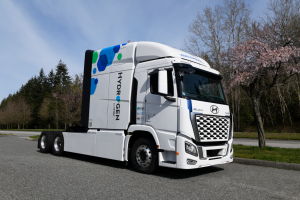Supporting Canada’s Climate Goals
From 1990 to 2023, Canada’s overall emissions growth was driven primarily by increases in the oil and gas, agriculture, and transportation sectors. In 2023, the transport sector was the second largest source of greenhouse gas (GHG) emissions, accounting for 23% of Canada’s total GHG emissions, underscoring the growing impact of the sector on Canada’s climate goals[i].
The Government of Canada has committed to a target of 35% of all new medium and heavy-duty vehicles (MHDV) sales to be zero-emission vehicles (ZEVs) by 2030, with a goal of reaching 100% for certain vehicle categories by 2040[ii]. While not yet law, these signals are prompting companies to explore clean technologies.
Why Hydrogen?
To support the transition to a low-carbon future, clean fuel alternatives must become more accessible. Decarbonizing the transportation economy will require a suite of options tailored to different vehicle types and use cases. In the passenger vehicle space, hybrid and battery electric vehicles (EV), are gaining steady traction. However, when it comes to heavy-duty vehicles, some of these clean alternative options face limitations due to range, payload, and fueling time. This is where hydrogen fuel cell electric vehicles (FCEVs) stand out.
Where FCETs Are Already Making an Impact
While HTEC will be one of the first to deploy hydrogen fuel cell trucks on Canadian roads, FCETs have already been running and seen success in other countries.
Since October 2020, a total of 48 XCIENT Fuel Cell Class 8 trucks have been in operation in Switzerland. By June 2024 they successfully completed a driving distance of 10 million km powered by only green hydrogen, saving around 6,300 tonnes of carbon dioxide[iii].
In the United States, G.E.T. Freight is operating 30 Hyundai XCIENT Fuel Cell trucks at the Ports of Oakland and Richmond as part of the NorCAL ZERO Project. Since September 2023, the fleet has logged nearly 724,200 km in zero-emission freight transport[iv].
In Georgia, USA, Hyundai Motor Group Metaplant America (HMGMA), in partnership with Glovis America, is operating 21 XCIENT fuel cell trucks to support nearly half of the plant’s logistics operations. These trucks are powered by on-site hydrogen production and fueling infrastructure, demonstrating a practical application of clean hydrogen in industrial logistics[v].
Several countries in Europe and Asia are deploying and planning large-scale FCET rollouts to decarbonize heavy-duty transport, supported by investments in hydrogen refueling and clean hydrogen production—similar to HTEC’s approach through our H2 Gateway Program.
Operational Considerations
Hydrogen Fuel Cell Electric Trucks (FCETs) are electric vehicles powered by a combination of a fuel cell and a battery. The fuel cell generates electricity from hydrogen to charge the battery and power the motor. Because of its structure, FCETs offer many benefits including:
- No emissions from the tailpipe
- Regenerative braking (Up to 20% total energy recovery)
- Quiet and smooth
- Support high payload capacities
- Fueling in 20 minutes
- Long Range
While all vehicles may require heating to start in extreme cold (e.g., lower than -20°C), FCETs retain most of their range in such conditions, unlike some battery-electric trucks, which can lose up to 20–40% of their range in similar weather[vi].
For fleets operating on tight schedules, especially those using slip-seating models where trucks run nearly 24/7, fast refueling becomes a critical advantage. Battery-electric trucks often require long charging times, which can be a barrier for many operators. Whereas FCET’s are able to fuel in under 20 minutes.
Safety is central to vehicle design: hydrogen trucks use certified, carbon-fiber-wrapped hydrogen tanks that undergo rigorous testing, with built-in safety systems like thermal pressure relief valves that vent hydrogen safely if needed. Multiple hydrogen sensors continuously monitor for leaks, triggering alerts long before any risk emerges. These features not only meet stringent safety standards but also give operators peace of mind.
Why Leasing Makes Sense
Switching to clean technology can present challenges, such as high upfront costs and limited infrastructure. HTEC’s Vehicle Leasing Corporation (VLC) addresses these challenges by offering a bundled, no-CapEx solution that includes leased FCETs with minimal upfront costs, backed by a full-service hydrogen ecosystem. This ecosystem features a local hydrogen production facility supplying nearby heavy-duty stations, a dedicated hydrogen-safe maintenance bay, factory-trained technicians, and comprehensive driver training. By removing the need for fleets to invest in their own fueling infrastructure, HTEC is simplifying and derisking the transition to zero-emission transport, aligning with corporate ESG goals and preparing operators for future regulatory requirements.
Be Part of the Solution
As Canada accelerates its transition to a low-carbon future, decarbonizing the heavy-duty transport sector will be critical. Hydrogen fuel cell electric trucks offer a practical, scalable, and zero-emission solution. HTEC’s Vehicle Leasing Corporation makes adoption easier by providing a no-CapEx, full-service leasing model that includes trucks, fueling infrastructure, maintenance, and training. With proven success internationally and a growing support network here in B.C., FCETs present a unique opportunity for early adopters to lead the charge. By lowering barriers and simplifying the path to clean transportation, HTEC is helping drive real progress toward Canada’s climate goals.
Learn more about our hydrogen fuel cell trucks and leasing program: https://www.htec.ca/truck-leasing/form/

[i] Government of Canada – Green House Gas Emissions
[ii] Transport Canada – Canada’s Zero-Emission Vehicle Sales Targets
[iii] Hyundai Motor – XCIENT Fuel Cell Trucks Achieve 10 Million km in Switzerland
[iv] Hyundai Motor Company Newsroom – NorCAL ZERO Project
[v] Hyundai Motor Group Deploys XCIENT Hydrogen Fuel Cell Trucks for HMGMA Clean Logistics
[vi] The Globe and Mail – Real-world tests show which EVs lose the least range in the winter
